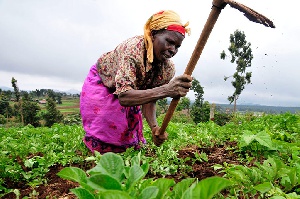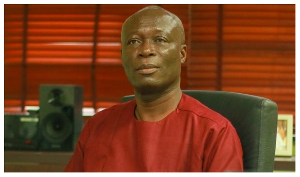The high cost of fertiliser coupled with the lack of access to credit by smallholder farmers in the country is eroding the earnings on their investments thereby cutting yields from the agricultural sector and putting food security at risk, Dr. Kofi Debrah, Chief of Party, USAID West Africa Fertilizer Program, has disclosed to the B&FT.
He said the country is gradually losing out on exploring the opportunities offered by the application of fertiliser to increase food production because over the past years, emphasis has been placed on increasing quantity rather than ensuring efficient usage and access to fertilisers at a subsidised price.
“Contrast to expectation that detailed use of fertiliser will boost crop yields, available information shows that fertiliser cost is rather swallowing the profit of investors in the sector given full market fertilizer prices and low crop response to fertiliser due to inappropriate usage.
“Current policy efforts are focused, through the Fertilizer Subsidy Program, on lowering the cost of fertiliser to farmers to increase its usage but little attention is paid to soil fertility management that would increase crop response to fertilizer to boost yield,” he said.
The comments come in the wake of recent decision by some of the country’s biggest fertilizer dealers to pull out of the government’s Fertiliser subsidy programme due to the government’s failure to pay for the subsidies on time. Some farmers have told the B&FT that the decision of the fertilizers to withdraw from the subsidies programme will negatively affect them, as having to buy on the open market will come at an extra cost.
More so, in the face of current declines in soil fertility, which contributed to a decrease in Ghana’s agricultural output from 32 percent in 2009 to 22 percent in 2013, there is the need to supplement derailed soil with effective use of fertiliser to surge output.
According to the Ministry of Food and Agriculture, the country has about 13.6 million hectares of agriculture land, 7.8 million of which is under cultivation and 6.1 million remain in the arable state.
Ghana currently consumes around 10 kg per hectare of fertilizer although analysis by the Crops Services Department of MOFA, show fertiliser use has increased to 12 kg per hectare as a result of the Fertiliser Subsidy Programme (FSP),which started in 2008 and has accounted for roughly 40 percent of total fertilizer use during the 2011 to 2013 period.
The objectives of the FSP are to increase farmers’ accessibility to inputs and also raise application rates from current average of 10kg/ha to at least 20kgs/ha and therefore raise farmers’ incomes. Unfortunately the FSP focuses only on inorganic fertilisers which do not necessarily improve agricultural productivity in isolation of other yield-enhancing technologies and practices.
There is equally the want for complementary investments in improved seeds, soil and water conservation, and organic forms of fertilizer, such as compost, manure, and other sources of organic matter which is crucial to increasing agricultural productivity.
Dr. Debrah recommended the need for sustainable agricultural intensification and productivity using a combination of organic and inorganic fertilisers as that increases crop response rates to inorganic fertiliser.
He called for proper soil fertility management, especially through the Fertilizer Subsidy Program, that would increase crop response to fertilizer and yield more per hectare.
Similarly, Charles Lawrence Twumasi-Ankrah, Executive Member of Oil Palm Smallholders and Outgrowers of Ghana, concurred that high cost of fertiliser remains disincentive to farmers, thus limiting their output.
The IFDC a public non-profit organization, focused on increasing and sustaining food security and agricultural productivity in over 100 developing countries through the development and transfer of effective and environmentally sound crop nutrient technology and agribusiness expertise.
Business News of Tuesday, 4 August 2015
Source: B&FT

















